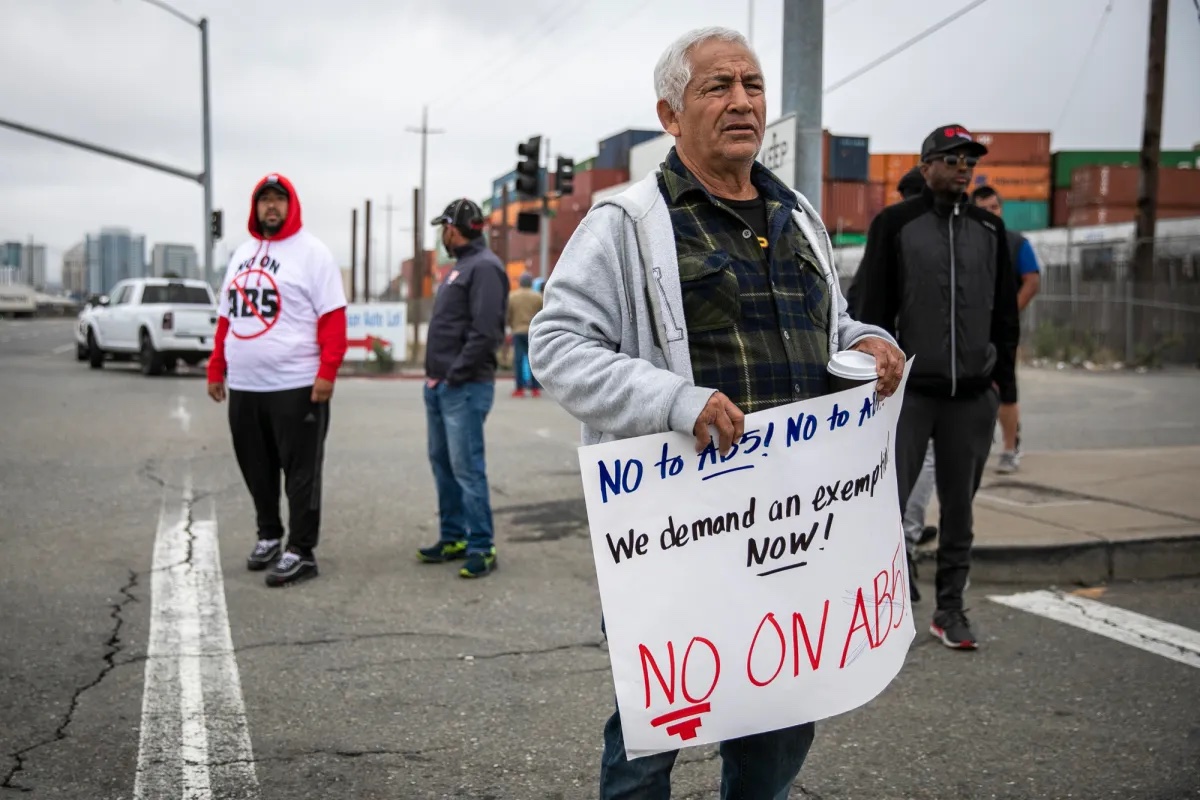As Gov. Gavin Newsom takes action on a slew of gun control bills, truckers are accusing him of failing to respond to a controversial state labor law they’ve been protesting for weeks, halting almost all operations at the Port of Oakland’s shipping terminals and snarling an already severely backlogged supply chain.
First up: the gun bills. Newsom on Thursday signed into law a package of legislation tightening California’s strictest-in-the-nation gun regulations — though he has yet to approve the pièce de résistance, a bill modeled on Texas’ abortion law that would allow private Californians to sue anyone who manufactures, distributes or sells certain illegal firearms. Today, Newsom is set to hold an event in Los Angeles highlighting the state’s efforts to “limit the spread of illegal guns.”
Among the eight proposals Newsom greenlighted, which add to a pile he signed last week:
- A bill banning people convicted of child and elder abuse from owning a firearm for 10 years.
- A bill banning firearm sales on state property, including gun shows at county fairgrounds.
- A bill requiring anyone who produces more than four firearms per year — either by milling together unfinished components or using 3D printers — to first get a gun manufacturing license from the state.
- A bill mandating school districts to provide annual information to parents about California’s safe gun storage laws and report any “perceived threat” of a mass shooting event to law enforcement. It would also require law enforcement or school police to conduct an investigation and threat assessment, including a search of school and student property under certain conditions.
“None of us can afford to be complacent in tackling the gun violence crisis ravaging our country. … California will continue to lead on lifesaving policies that provide a model for action by other states and the nation,” Newsom said in a press release announcing the bill signings.
Meanwhile, another crisis is building at the Port of Oakland, where truckers have since Monday been protesting AB 5, a state labor law that requires companies to reclassify many of their independent contractors as employees. The law has thrown into jeopardy the legal status of California’s approximately 70,000 independent truck owner-operators, even as labor groups say it will protect them from wage theft and other abuses.
The demonstrations — which follow protests last week at the ports of Los Angeles and Long Beach — have shut down trucking operations at three of the Port of Oakland’s four marine cargo terminals since Monday afternoon, Robert Bernardo, the port’s director of communications, told me Thursday. The protests have also blocked hundreds of unionized dockworkers from entering, according to labor leaders. That’s forced the port’s largest marine terminal operator to halt work on board ships and docks due to a shortage of labor, Bernardo said.
Truckers say they plan to continue blocking the West Coast’s third-busiest container port until Newsom agrees to meet with them and listen to their concerns about the law’s impact on their business model, according to the Wall Street Journal.
- Protester Bill Aboudi, owner of AB Trucking, told CNBC: “So far there has been no contact with the governor’s office. It seems the governor is not concerned about taking American workers’ rights away.”
- A spokesperson for Newsom’s office told me in a statement: “California is committed to … ensuring our state’s truck drivers receive the protections and compensation they are entitled to. This administration has employment tax incentives, small business financing, and technical assistance resources to support this essential industry. The state will continue to partner with truckers and the ports to ensure the continued movement of goods to California’s residents and businesses, which is critical to all of us.”
Bernardo said it’s not clear when trucking operations will resume at the Port of Oakland: “We have no idea because we don’t know what the truckers are gonna do. … We want a resolution. Any extended disruption of the Oakland seaport is going to be costly in terms of local jobs and businesses that rely on goods movement. … In this business, time is money.”
If the disruptions continue, he added, shipping companies are going to start taking their business elsewhere, such as ports in Georgia and Virginia.
